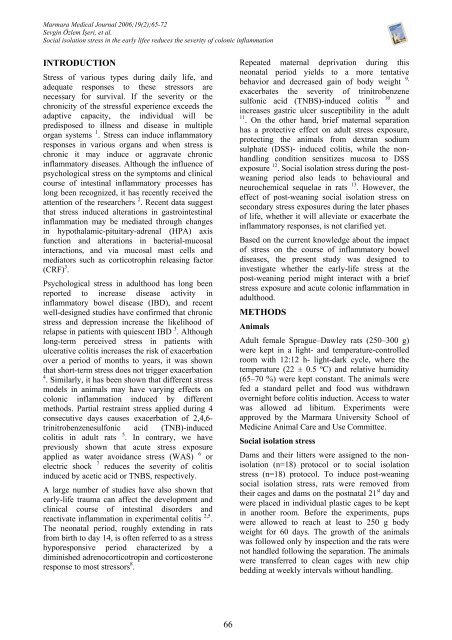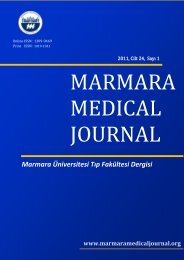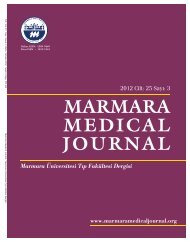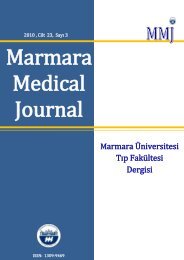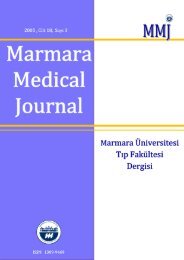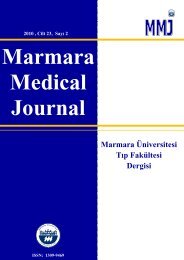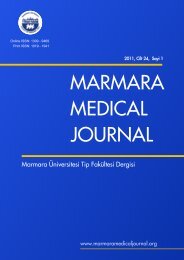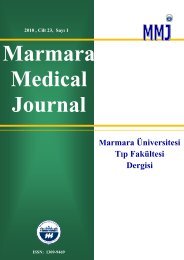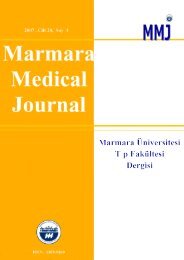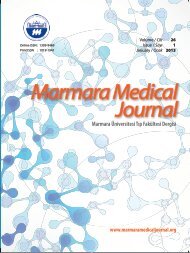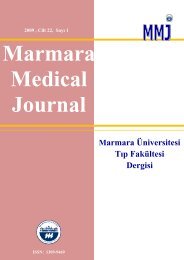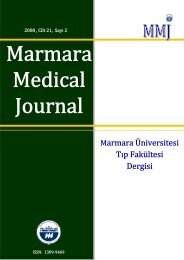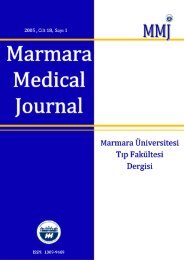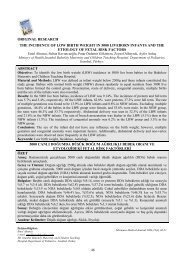Tam Metin PDF (3983 KB) - Marmara Medical Journal
Tam Metin PDF (3983 KB) - Marmara Medical Journal
Tam Metin PDF (3983 KB) - Marmara Medical Journal
Create successful ePaper yourself
Turn your PDF publications into a flip-book with our unique Google optimized e-Paper software.
<strong>Marmara</strong> <strong>Medical</strong> <strong>Journal</strong> 2006;19(2);65-72<br />
Sevgin Özlem İşeri, et al.<br />
Social isolation stress in the early lifee reduces the severity of colonic inflammation<br />
INTRODUCTION<br />
Stress of various types during daily life, and<br />
adequate responses to these stressors are<br />
necessary for survival. If the severity or the<br />
chronicity of the stressful experience exceeds the<br />
adaptive capacity, the individual will be<br />
predisposed to illness and disease in multiple<br />
organ systems 1 . Stress can induce inflammatory<br />
responses in various organs and when stress is<br />
chronic it may induce or aggravate chronic<br />
inflammatory diseases. Although the influence of<br />
psychological stress on the symptoms and clinical<br />
course of intestinal inflammatory processes has<br />
long been recognized, it has recently received the<br />
attention of the researchers 2 . Recent data suggest<br />
that stress induced alterations in gastrointestinal<br />
inflammation may be mediated through changes<br />
in hypothalamic-pituitary-adrenal (HPA) axis<br />
function and alterations in bacterial-mucosal<br />
interactions, and via mucosal mast cells and<br />
mediators such as corticotrophin releasing factor<br />
(CRF) 3 .<br />
Psychological stress in adulthood has long been<br />
reported to increase disease activity in<br />
inflammatory bowel disease (IBD), and recent<br />
well-designed studies have confirmed that chronic<br />
stress and depression increase the likelihood of<br />
relapse in patients with quiescent IBD 3 . Although<br />
long-term perceived stress in patients with<br />
ulcerative colitis increases the risk of exacerbation<br />
over a period of months to years, it was shown<br />
that short-term stress does not trigger exacerbation<br />
4 . Similarly, it has been shown that different stress<br />
models in animals may have varying effects on<br />
colonic inflammation induced by different<br />
methods. Partial restraint stress applied during 4<br />
consecutive days causes exacerbation of 2,4,6-<br />
trinitrobenzenesulfonic acid (TNB)-induced<br />
colitis in adult rats 5 . In contrary, we have<br />
previously shown that acute stress exposure<br />
applied as water avoidance stress (WAS) 6 or<br />
electric shock 7 reduces the severity of colitis<br />
induced by acetic acid or TNBS, respectively.<br />
A large number of studies have also shown that<br />
early-life trauma can affect the development and<br />
clinical course of intestinal disorders and<br />
reactivate inflammation in experimental colitis 2,5 .<br />
The neonatal period, roughly extending in rats<br />
from birth to day 14, is often referred to as a stress<br />
hyporesponsive period characterized by a<br />
diminished adrenocorticotropin and corticosterone<br />
response to most stressors 8 .<br />
Repeated maternal deprivation during this<br />
neonatal period yields to a more tentative<br />
behavior and decreased gain of body weight 9,<br />
exacerbates the severity of trinitrobenzene<br />
10<br />
sulfonic acid (TNBS)-induced colitis and<br />
increases gastric ulcer susceptibility in the adult<br />
11 . On the other hand, brief maternal separation<br />
has a protective effect on adult stress exposure,<br />
protecting the animals from dextran sodium<br />
sulphate (DSS)- induced colitis, while the nonhandling<br />
condition sensitizes mucosa to DSS<br />
exposure 12 . Social isolation stress during the postweaning<br />
period also leads to behavioural and<br />
neurochemical sequelae in rats 13 . However, the<br />
effect of post-weaning social isolation stress on<br />
secondary stress exposures during the later phases<br />
of life, whether it will alleviate or exacerbate the<br />
inflammatory responses, is not clarified yet.<br />
Based on the current knowledge about the impact<br />
of stress on the course of inflammatory bowel<br />
diseases, the present study was designed to<br />
investigate whether the early-life stress at the<br />
post-weaning period might interact with a brief<br />
stress exposure and acute colonic inflammation in<br />
adulthood.<br />
METHODS<br />
Animals<br />
Adult female Sprague–Dawley rats (250–300 g)<br />
were kept in a light- and temperature-controlled<br />
room with 12:12 h- light-dark cycle, where the<br />
temperature (22 ± 0.5 ºC) and relative humidity<br />
(65–70 %) were kept constant. The animals were<br />
fed a standard pellet and food was withdrawn<br />
overnight before colitis induction. Access to water<br />
was allowed ad libitum. Experiments were<br />
approved by the <strong>Marmara</strong> University School of<br />
Medicine Animal Care and Use Committee.<br />
Social isolation stress<br />
Dams and their litters were assigned to the nonisolation<br />
(n=18) protocol or to social isolation<br />
stress (n=18) protocol. To induce post-weaning<br />
social isolation stress, rats were removed from<br />
their cages and dams on the postnatal 21 st day and<br />
were placed in individual plastic cages to be kept<br />
in another room. Before the experiments, pups<br />
were allowed to reach at least to 250 g body<br />
weight for 60 days. The growth of the animals<br />
was followed only by inspection and the rats were<br />
not handled following the separation. The animals<br />
were transferred to clean cages with new chip<br />
bedding at weekly intervals without handling.<br />
66


